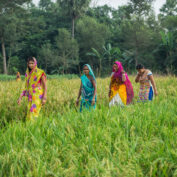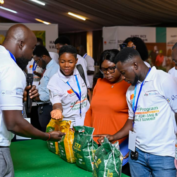
TechnoServe Agri-Food Systems Lead: World Food Day is a Call for Collective Action
The nonprofit’s global director for agri-food systems transformation highlighted the critical role of collaboration

The nonprofit’s global director for agri-food systems transformation highlighted the critical role of collaboration
Talent Sabani had left Zimbabwe to find work to support his young family. But he soon found surprising success in coffee farming closer to home.
Discover how hands-on training helped a Rwandan father increase his income, educate his kids, and build a better life for his family.
In the first edition of our series, African think tank founder Rashid Abubakar calls for a transformative shift in how we understand and practice development.
At 33 years old, Abigail Amoakowaa Bofah, a mother of two young children, is proving that motherhood and ambition can go hand in hand. Abigail lives in Techimantia, a town in the Ahafo Region of Ghana. She is steadily building a livelihood that reflects both her agricultural training and her determination to create a better future for her family.
Learn about the people who work behind the scenes to get food from farm to table and why their success is crucial for reducing food loss and waste across Africa.

TechnoServe, Mastercard Foundation, and Agri-Impact Limited convened key stakeholders in Kumasi to support youth-led agribusiness growth
Our monthly photo series highlights the beauty and emotion in the lives of our clients around the world. This month, we’re featuring families across three continents who are working hard to break the cycle of poverty.
As the International Day for the Eradication of Poverty approaches, we look at some of the less conventional ways TechnoServe and other organizations are ensuring that everyone can prosper.
Sinovuyo Sandisiwe Papu, 31, left her corporate job in 2016 to chase her dream of being an entrepreneur and fashion designer. Today, she owns a successful Johannesburg-based business, Arore Designer Boutique. But the path to success wasn’t without its challenges.